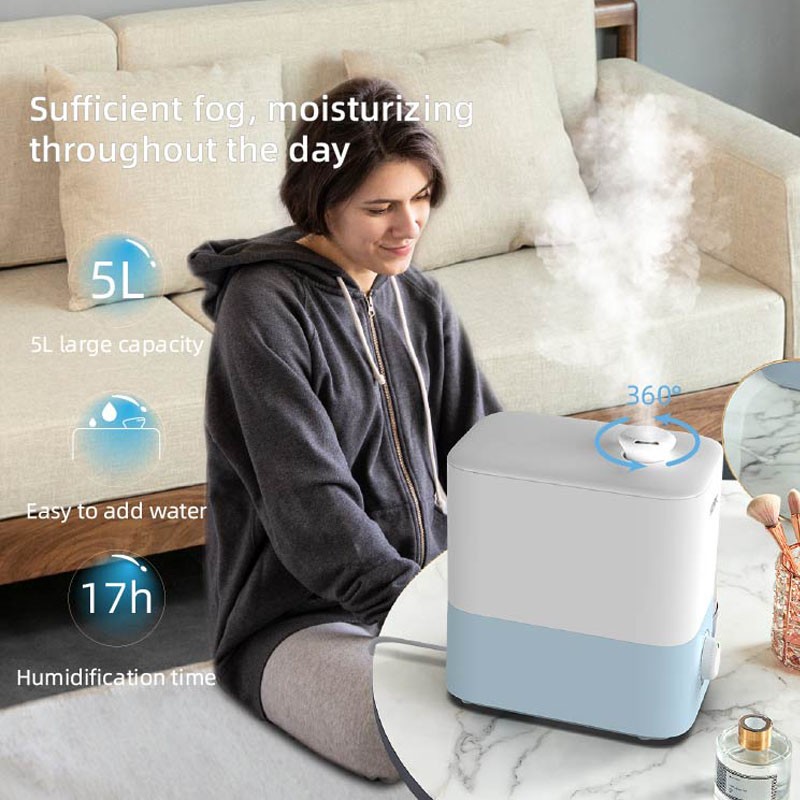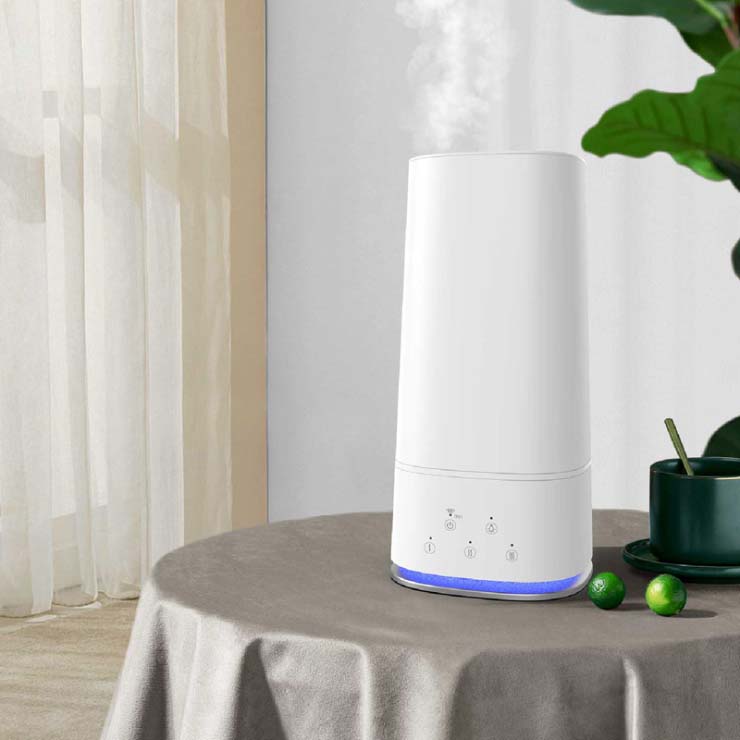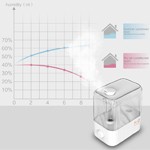Do you need a humidifier in winter?
Sep 24, 2022
There are two reasons why the air in your home is dry in winter:
1. Cold Weather - Cold weather means drier air. This can affect the humidity in your home. In winter, indoor relative humidity can drop below 30%, increasing virus transmission and other health hazards.
2. Your heating equipment - The equipment you rely on for heating can also remove moisture from the air during the cold winter months.
Winter is the best time to use a humidifier, as the temperature will be low and the relative humidity will be below 30%. On cold days, we will turn on the heater to keep warm and cozy. Without any windows, the uncirculated hot air dries out the moisture in the room, making the air stale and uncomfortable to breathe. With the operation of the humidifier, it will improve the background of the indoor air quality even if the heating equipment continues to work.
Is there any benefit to using a humidifier in winter?
1. Health
Maintaining the right level of humidity throughout your home not only helps keep your skin safe from dryness-induced irritation, but also keeps your nasal and respiratory tract healthy. This, in turn, contributes to your susceptibility to colds and flu, which spread more frequently in the dry air of winter.
Bacteria and viruses also cannot spread in moist air. For example, a study published in 2013 concluded that increasing a property's humidity level to 43 percent or higher can greatly reduce the ability of airborne viruses to cause flu-related infections. In fact, environments with low humidity had a 70% to 77% chance of causing disease caused by the virus, but when humidity levels increased to 43% or higher, that number dropped significantly to just 14%.
Children and adults with asthma often find a humidifier to help breathing, especially when the condition is combined with a respiratory infection. If you have asthma and wish to use a humidifier, be sure to consult your doctor first.
Preventing dryness is nearly impossible for someone who breathes by mouth, especially while sleeping. Humidifying the air with a humidifier can help create a more favorable environment, which may help you sleep more comfortably and also reduce your snoring. Running a humidifier throughout the day will also help keep your throat moist, preventing any irritation associated with snoring.
2. Save humidity
Humidity levels are an important factor in preventing problems caused by dry air throughout your home. Your wooden doors, crown molding, floors and furniture can be damaged by moisture loss. Dry air can cause blisters, crevices, damage to home decor or cracks in wood and furniture. This damage occurs when dry air sucks the needed moisture out of the home. These problems can have long-term effects and may cost you money to repair or replace them. One of the smartest ways to reduce damage and extend the life of your home is to address indoor air and humidity conditions.
Cold, dry air can draw moisture from the skin, leading to various problems such as dullness, dryness, flaking, and premature aging. A humidifier can help with these problems during the winter. The indoor humidity level of the heated air in the furnace can be reduced to 10% or less. However, humidifiers add valuable moisture to the skin and air, helping to prevent all these harmful effects and maintaining a healthy, vibrant look for all of your holiday gatherings and parties.
3. Comfortable humidity
A humidifier is essential in winter because the hot air from the stove is dry. Dry air has low humidity and absorbs moisture from you and everything in your home. This in turn makes you uncomfortable and wastes energy and money on the heating system by trying to keep you warm. Dry air doesn't hold heat very well, so by adding water vapor from a humidifier, it balances the humidity, moist air feels warmer, and prevents your stove from working overtime. So when your thermostat is set at a lower temperature, a humidifier can help you and your home feel comfortable, which can lower your utility bills. Since we spend more than 90% of our time indoors, and on average we spend at least a third of our day at home, you can see why investing in humidity control is important.
Which type of humidifier is best for winter?
Warm mist humidifiers are better for winter use, but only by a little bit. It is powered by a steam evaporator that dissipates heat during humidification. Warm mist humidifiers not only affect room temperature, but are also great for clearing up stuffy noses, inflammation, nosebleeds, and dry throats. Cool mist humidifiers are also a good option, either ultrasonic or impeller. Ultrasonic humidifiers use small metal plates to vibrate ultrasonic frequencies to create water droplets. The water droplets will then leave in the form of fog. Impeller humidifiers use a combination of rotating discs and running diffusers to create mist.
When to use a warm mist humidifier?
In winter when the air is dry and cold, a warm mist humidifier is best. The heat from the steam can help warm the room. Perfect for a good night's sleep on a cold night. Use a warm mist humidifier if you don't have young children, children, or pets at home. Hot water can cause burns if it comes into contact with steam or tip over the dehumidifier. The heating mechanism will reduce mineral buildup and operate quietly in the background. If you want one without worrying about maintenance or cleaning, go for it.
When to use a cool mist humidifier?
If you value affordability and energy savings, use a cool mist humidifier. Generally, it will disperse more moisture and therefore cover more ground than a warm mist. This is perfect if you have a newborn or baby at home. Not only is the cool air easy to breathe, it also helps soften mucus blockages and relieve allergy symptoms. A cool mist humidifier can be the key difference between a happy baby or a grumpy baby.
When not to use a humidifier?
Never use a humidifier when the relative humidity level is above 50%. To find out how humid your room is, buy a hygrometer that won't cost you more than $20. If your humidifier shows signs of mold or microbial infestation, clean it first. No distilled or softened water in the bucket Finally, look for a musty smell that persists or signs that woodwork is starting to rot. Growing mold on walls and ceilings is also a good indicator of excess moisture, so don't use it.


